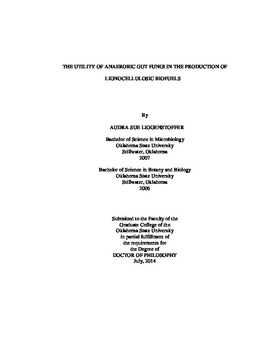| dc.contributor.advisor | Elshahed, Mostafa S. | |
| dc.contributor.author | Liggenstoffer, Audra Sue | |
| dc.date.accessioned | 2015-06-17T20:06:45Z | |
| dc.date.available | 2015-06-17T20:06:45Z | |
| dc.date.issued | 2014-07 | |
| dc.identifier.uri | https://hdl.handle.net/11244/14969 | |
| dc.description.abstract | The overall aim of this dissertation was to determine the prevalence and distribution of anaerobic gut fungi (AF) in nature and to evaluate the potential of AF isolates in producing biofuels from lignocellulosic plant substrates. Three different research projects were undertaken to achieve this aim. I started by investigating the diversity and community structure of anaerobic gut fungi in fecal samples obtained from a large number of mammalian and reptilian herbivores using a culture-independent approach that involved the amplification and sequencing of the internal transcribed spacer (ITS-1) region in the rRNA operon. This work revealed a highly diverse anaerobic fungal community within herbivores, with many novel, previously un-encountered lineages identified. Eight distinct AF groups representing putatively novel genera were detected, several of which have subsequently been independently confirmed by other research groups around the world. In the second project, multiple isolation strategies were employed in an effort to obtain robust anaerobic fungal isolates capable of growing on various lignocellulosic substrates. This effort yielded a novel anaerobic fungal isolate, Orpinomyces sp. strain C1A, isolated on media supplemented with cellobiose and switchgrass. Experimental analyses indicated that strain C1A is a remarkable biomass degrader, capable of simultaneous saccharification and fermentation of the cellulosic and hemicellulosic fractions in multiple grasses and crop residues, with and without biomass pretreatment. In my final project, I evaluated the utility of hydrothermal biomass pretreatment in degradation schemes using strain C1A. Hydrothermolysis-pretreated lignocellulosic biomass (corn stover and switchgrass) was more amenable to degradation by strain C1A when compared to untreated biomass. However, when factoring in the proportion of biomass lost during the pretreatment process, hydrothermolysis provided negligible or negative improvements to the extent of corn stover and switchgrass degradation by strain C1A. Collectively, the results of these projects demonstrate the remarkable genus and species level diversity within the anaerobic gut fungal communities in nature, and suggests that these organisms could represent a promising platform for biofuel production from lignocellulosic biomass. However, since anaerobic fungi produce organic acids rather than alcohols as their major fermentation products, efforts towards improving alcohol production and tolerance via physiological and genetic manipulations are still required to achieve efficient and commercially appealing ethanol production. | |
| dc.format | application/pdf | |
| dc.language | en_US | |
| dc.rights | Copyright is held by the author who has granted the Oklahoma State University Library the non-exclusive right to share this material in its institutional repository. Contact Digital Library Services at lib-dls@okstate.edu or 405-744-9161 for the permission policy on the use, reproduction or distribution of this material. | |
| dc.title | Utility of anaerobic gut fungi in the production of lignocellulosic biofuels | |
| dc.contributor.committeeMember | Burnap, Robert Lord | |
| dc.contributor.committeeMember | Patrauchan, Marianna A. | |
| dc.contributor.committeeMember | Prade, Rolf A. | |
| dc.contributor.committeeMember | Marek, Stephen M. | |
| osu.filename | Liggenstoffer_okstate_0664D_13537.pdf | |
| osu.accesstype | Open Access | |
| dc.type.genre | Dissertation | |
| dc.type.material | Text | |
| dc.subject.keywords | anaerobic fungi | |
| dc.subject.keywords | biofuels | |
| dc.subject.keywords | diversity | |
| dc.subject.keywords | hydrothermolysis | |
| dc.subject.keywords | ITS1 | |
| dc.subject.keywords | orpinomyces | |
| thesis.degree.discipline | Microbiology, Cell and Molecular Biology | |
| thesis.degree.grantor | Oklahoma State University | |
